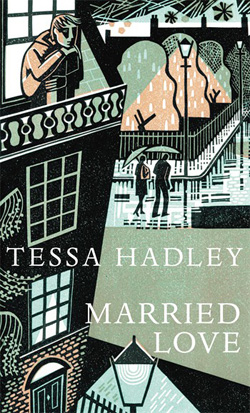You have no items in your cart. Want to get some nice things?
Go shopping
Why aren’t more short stories about happiness? Writers are a grim bunch, by and large. If there’s a slough of misery they can send their characters into, chances are they will. As readers, we’re so conditioned to expect anguish in literature that we can’t help but feel dread when we spot a “Chekov’s Gun”—a seemingly irrelevant element of the story that foreshadows an event of significance—which will surely be the cause of strife.
But there is a certain breed of short story that is subtler, potentially more devastating, and certainly harder to pull off; where Chekov’s gun remains on the wall and the characters are, if not universally, then at least occasionally, fleetingly, happy. Tessa Hadley‘s collection, Married Love, is full of such gems.
Hadley enjoys playing with our expectations of an unhappy ending. In “Because the Night”, a disused well lurks ominously from the get-go; in “Friendly Fire”, a mother awaits news from her son in Afghanistan; in “She’s the One”, Ally wades impulsively into a freezing river; and in “Journey Home”, Alec can’t reach his emotionally unstable sister Emmie on the phone when his plane is delayed. We expect the worst, because that’s usually what happens in fiction, but what we get here is often less predictable, more believable and, sometimes, sadder.
These are complex, layered stories that give equal attention to small moments and whole lives. In the best story in the collection, “The Trojan Prince”, set in the 1920s, 16-year old James McIlvanney has his sights set on his wealthy cousin Ellen and her house full of furniture, but a childhood acquaintance, Connie, keeps dragging him back to his roots, reminding him where he comes from, what he really is. This is a love story, but there is no heartrending or unrequited passion; these are normal teenagers, feeling their way through inept flirtations and irrational dislikes towards their adult identities. James comes to terms with who he is and what he wants, not with fanfares or epiphanies, but as a matter of course, the gradual approach of a quiet happiness.
Not all the stories are happy, however. The title story, “Married Love”, follows Lottie, a gauche 19-year old music student engaged to her much older tutor, through her awkward wedding, mismatched marriage, three children, and the gradual calcifying of her ambitions and youth. It’s a sweeping scope for a short story, telescoping between passing years and passing instants, coming to an end in a seemingly insignificant moment in which Lottie’s lost hopes are brought into minute focus.
Many of the endings in this collection are abrupt. It’s a technique likely to alienate some readers, but I love it when its done well; it’s like having a rug pulled from under you, exposing the bare floorboards of the story unexpectedly.
In “She’s the One”, the worst has already happened. Ally’s brother has committed suicide even before the first line of the story is complete, and Ally is dealing with the fallout. She meets Hilda, a spiky, rude Canadian writer staying at the retreat where Ally works. Their not-quite-friendship becomes a place where Ally can go to assuage her grief.
Hadley has a gift for throwing a character into sharp focus with only a few words, like this from “Married Love”:
Em was gracefully loose-jointed, with her mother’s hooded, poetic eyes; she worked in the toxicology department of the city hospital.
Or this from “Friendly Fire”:
All Pam’s conversations began as if you hadn’t stopped talking since you last saw her; they were as cluttered as her car.
And this image from “The Trojan Prince”:
She’s like a cat, James thinks. A sloppy little cat. Under the neat-fitting cap of her new hair, her face is intensely familiar – small and precise like a muzzle, freckled and snub-nosed, the brows exclamation points, always slightly raised.
I found myself nodding in recognition as I read, recognition of feelings that must be universal, but are hard to articulate: walking into a warm, noisy pub and seeing someone you love through the crowd; a moment of shared silence with a colleague after a hard day’s work; seeing your own parents transform into strangers in the company of their adult friends; or from “A Mouthful of Cut Glass”, the sensation of having someone familiar to you in one setting (a boyfriend from university) transposed into an entirely different setting (your childhood home):
She was taken aback by this stranger of hers, ensconced so outrageously in the innermost sanctum of her family home. The shock of it was voluptuous; she felt with a shudder that the closer Neil came to her, the less familiar he was.
This is what the short story does when it’s working well: reflecting what we feel back at us, making it as strange as it is familiar, as if we had caught a glimpse of ourselves from a new angle in an unexpected mirror. Despite loneliness, loss, love, jealously, grief and all the other emotions that beset us, most of us still manage to be quietly happy, most of the time. This strange paradox is at the heart of this collection.
First published 5 Jan 2012 by Jonathan Cape. Available in hardback and ebook.

About Emily Cleaver
Emily Cleaver is Litro's Online Editor. She is passionate about short stories and writes, reads and reviews them. Her own stories have been published in the London Lies anthology from Arachne Press, Paraxis, .Cent, The Mechanics’ Institute Review, One Eye Grey, and Smoke magazines, performed to audiences at Liars League, Stand Up Tragedy, WritLOUD, Tales of the Decongested and Spark London and broadcasted on Resonance FM and Pagan Radio. As a former manager of one of London’s oldest second-hand bookshops, she also blogs about old and obscure books. You can read her tiny true dramas about working in a secondhand bookshop at smallplays.com and see more of her writing at emilycleaver.net.




